Ethan Bate
University: Bangor University
Studying/Course: German and Spanish
Languages: English, German, Spanish
A German/Spanish BA student from Bangor University, currently spending the academic year studying in Vigo, Spain and Bayreuth, Germany.
Blogs:
Entertainment and Leisure
Universidade de Vigo.
Health and Fitness
Universidade de Vigo.
Festivals and Celebrations
Universidade de Vigo.
Entertainment and Leisure
¡Hola! Me llamo Ethan y durante el último cuatrimestre estudiaba en Vigo (una ciudad del noroeste de España en una región que se llama Galicia). En este blog, voy a hablar de mis experiencias de entretenimiento y ocio en España.
There were a few options in terms of things to do with free time in Vigo. Lots of people liked to go shopping in the city centre (ir de compras), others liked to go bowling (jugar a los bolos), but my favourite thing to do in my free time was to head out and explore the various beautiful nearby places in and around Vigo (explorar).
En septiembre, cuando el tiempo todavía era agradable, fui a las cercanas Islas Cíes. Se necesita un visado (visa) especial para visitar las islas, ya que están protegidas y sólo se puede llegar a ellas en barco. Las islas eran inmensamente hermosas. Subimos a la cima (summit) de una de las montañas y estábamos sobre las nubes (clouds) antes de relajarnos en la playa por el resto de la tarde. Desafortunadamente, perdí mi tarjeta de embarque para el barco de vuelta a Vigo, así que tuve que hablar con la tripulación (crew) a bordo antes de embarcar. Afortunadamente me recordaron del viaje de esa mañana, así que no me abandonaron en las islas para siempre.
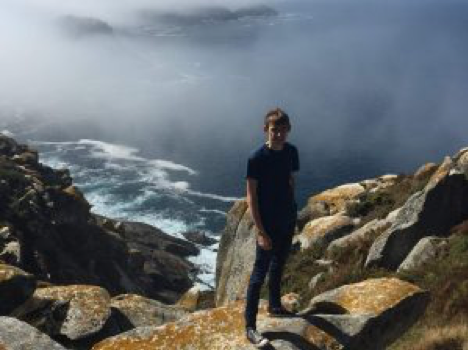
Above the clouds on the Islas Cíes
Another memorable trip would be one of the trips I did whilst completing a Galician course at the university. On this particular trip, we went to a small Galician village on the coast. It had small alleyways, typical Galician architecture and one of the cute cafés even served me a cup of tea with soya milk – what bliss! Also on this trip we visited a historical fort (the Castro de Baroña), sort of similar to Stonehenge, but right by the sea and surrounded by a moat. It is perhaps one of the best remaining examples of a Galician fort (castro), where you can still even see where the twenty roundhouses would have stood all those years ago.

Looking towards the Castro de Baroña
Tener la oportunidad de aprender otro idioma mientras estaba en España y poder aprender más sobre la cultura y el idioma de esta parte del país que es muy interesante y no muy estereotipada (stereotypical) de España fue fabuloso. Durante este curso, también tuvimos la oportunidad de participar en otros numerosos viajes gratuitos a otras partes de Galicia para conocer mejor la región, su cultura y su gente.
Outside of these trips and the Galician course, I also went bowling with friends a couple of times. The first thing that struck me about this was that it wasn’t a Bowlplex or a Tenpin or anything – Vigo’s two bowling alleys appeared to me to be totally independent brands! Also, it was incredibly cheap (barato)! (A real bonus when you have to spend so much more on a weekly shop because of the price of vegan meat alternatives out there). Lots of Vigueses (the name for the people of Vigo) liked to go bowling and grab a bite to eat in the onsite café, too (tapas was always provided for free).
De todas formas, espero que hayáis disfrutado de este primer blog y hasta la próxima vez, donde hablaré de salud y bienestar físico.
Ethan
Health and Fitness
¡Hola de nuevo! Vuelvo con otra entrada en el blog sobre mi estancia (stay) en Vigo, pero esta vez estoy aquí para hablar de la salud y la forma física en España. Así que, sin más preámbulos (without further ado), empecemos.
The Universidade de Vigo had a vast array (variedad) of sport opportunities on offer including swimming classes and gym sessions in the on-campus facilities, not to mention the fact that practically every weekend a group of students along with other members of the community left the university campus in a minibus heading for somewhere beautiful in Galicia, taking in all the scenery whilst on a hike (una caminata).
Como parte del curso de gallego en la universidad, uno de los fines de semana fui de excursión con mis compañeros de clase a la Fervenza do Toxa, una de las cascadas (waterfalls) más altas de España, que se encuentra en lo profundo de un hermoso bosque. Este viaje fue particularmente memorable, ya que recuerdo estar particularmente cansado cuando llegamos a la base de la cascada, pero aún así me sorprendió (amazed) la vista.
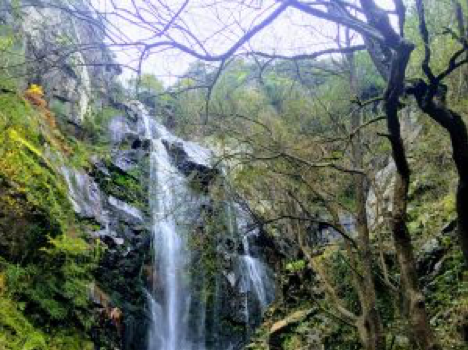
The awe-inspiring Fervenza do Toxa
When it comes to health and fitness, however, exercise isn’t the only thing that’s important – habits that affect your health such as smoking (fumar) as well as diet and nutrition need to be considered, too. From my point of view, the smoking culture in Spain was very different to that in the UK – it was much more commonplace (habitual) – and the data to be found online seems to agree with that. According to the Tobacco Atlas, 31.3% of male adult Spaniards versus 19.9% of male adult Brits smoke. This sad difference is definitely one that I noticed during my time in Spain, but at least Spain’s statistic isn’t as bad as the 47.6% of Chinese adult men who smoke, eh?!
Otra diferencia importante que encontré fue desde la perspectiva de la dieta. Como vegano en Gran Bretaña, la vida es bastante fácil. Hoy en día, todos los supermercados atienden (cater) a los veganos, y casi todos los restaurantes también pueden atendernos. La situación no era totalmente la misma en España, o al menos en mi parte de ella. Eso no quiere decir que sea imposible vivir como vegano o con cualquier otra restricción dietética en España (¡sobreviví!), sólo que no es tan fácil como me hubiera gustado (as I would have liked). Es muy importante decir, sin embargo, que la situación en Vigo no refleja (reflects) la situación en toda España. ¡En Valencia, por ejemplo, aparentemente hay muchas opciones para los veganos!
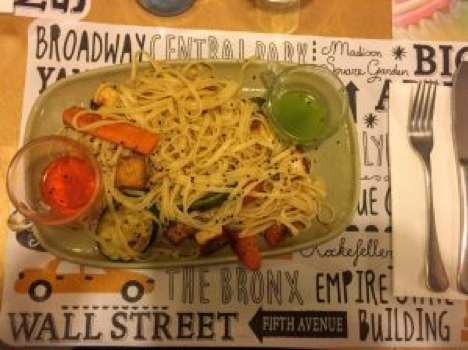
One of the numerous vegan options at Malak Bistró in nearby Santiago de Compostela
The final important subtopic of health and fitness I’d like to discuss in this blog is one that is sadly both heavily stigmatised (estigmatizada) and often overlooked (pasado por alto) – mental health (salud mental). If you have a mental health problem back home in the UK, chances are it’s not going to disappear just because of the Spanish sun (not that there was much of that in Galicia!). Equally, if you haven’t ever struggled with mental health before, the challenges associated with moving to another country, finding yourself in a totally new and different culture, being totally surrounded by people speaking another language, all whilst trying to quickly make friends may result in you experiencing a wide range of new emotions. The good news is all of this is totally fine and to be expected. Just know many, many people have been abroad on both study and work placements before and many, many more are going to go abroad for those same reasons in future – support (apoyo) is out there and you’re definitely not weak for wanting some. I’m aware that for you the Year Abroad may be in the very distant (or even in the not going to happen) future, either way settling down for the afternoon with a nice cup of tea and a spot of TV from home does not mean you’ve failed. Far from it, in fact, as it was in moments like these where I began to realise how much my Spanish had actually improved and how much I, as a person, was developing.
La próxima vez voy a hablar de algunos de los festivales y celebraciones que tuvieron lugar (took place) durante mi estancia en Vigo, así como (as well as) de algunos que lamentablemente me perdí ya que tendrán lugar más tarde durante el año. Espero que hayáis disfrutado de esta segunda entrada del blog. ¡Hasta la próxima!
Ethan
Festivals and Celebrations
¡Hola! En este último blog sobre la mitad española de mi año en el extranjero, voy a hablar de algunos de los festivales y celebraciones que aprendí durante mi estancia en Galicia.
During my time in Vigo many celebrations took place – many of which were specific to the region. As part of my Galician language and culture course, we had to learn about some of the most interesting celebrations that take place in Vigo and surrounding areas and we even got the chance to experience some of these festivals first-hand (de primera mano).
El magosto es posiblemente la más conocida de las celebraciones gallegas. Tiene lugar cada año a finales de octubre o principios de noviembre. Durante esta celebración la gente se reúne (gather) alrededor (around) de una hoguera (bonfire), bebe vino, escucha música tradicional gallega y, lo más importante, come castañas (chestnuts). Muchísimos magostos se celebraron en las parroquias (parishes) rurales cercanas (nearby) de Vigo, pero también hubo numerosos magostos en el centro de la ciudad.
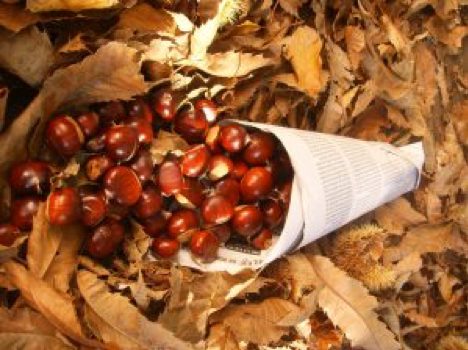
Magosto’s key ingredient – the humble chestnut (source: Wikimedia Commons)
Another celebration that occurs around the same time as Magosto in Galicia is Samaín, a pre-Christian Celtic celebration which takes place every 31st October (the date that traditionally marks the end of summer and the start of winter). It is believed that on this night the souls of the dead re-enter the world of the living in order to visit their loved ones. To celebrate this, a parade is held, people dress up and drink Queimada, a traditional Galician punch which is set alight whilst people recite a spell in order to ward off the evil spirits.
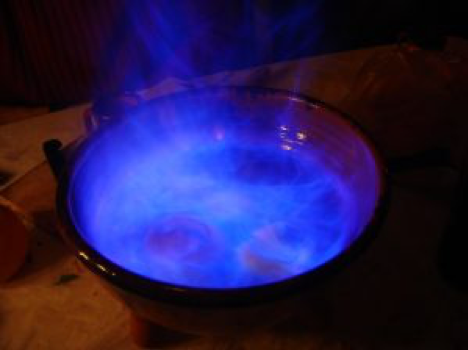
The Galician Queimada (source: Wikimedia Commons)
Como sólo estuve en Galicia durante el semestre de otoño/invierno (autumn/winter), lamentable no pude experimentar (experience) ninguna de las celebraciones que tienen lugar durante la primavera y el verano. Uno de estos eventos es entroido (o carnaval) que se celebra entra los meses de febrero y marzo durante los días anteriores al Cuaresma (Lent). Las fiestas se celebran en todos los rincones (corners) de Galicia, cada uno de los cuales tiene su propia máscara (mask) distintiva (distinctive). Por ejemplo: en el entroido de Laza llevan peliqueiros, mientras en Verín traen cigarróns y en el pueblo de Castrelo de Cima hay vellarróns. Hay muchísimas máscaras distintivas.
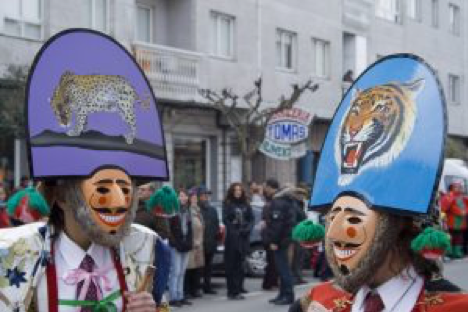
Two cigarróns in Verín for Entroido (source: Wikimedia Commons)
The Rapa das Bestas (Capture of the Beasts) is another example of a Galician summertime celebration that I missed, however this particular event is much more controversial than any of the previous ones I’ve discussed. This celebration involves the capture of the wild horses that freely roam the mountains of Galicia. Each year after their capture the horses are herded into enclosures known as curros, the foal marked, the adults shaved and deloused and all manes and tails cut. The reason for this event’s controversy is due to the fact that the horses are often treated roughly and incur injuries owing to this and horse fights.
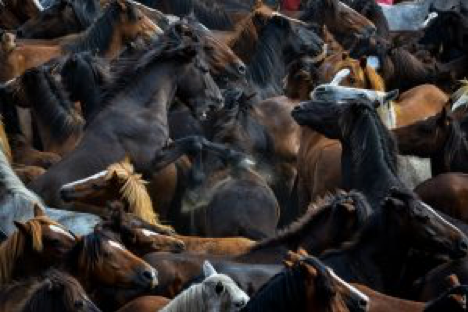
The Rapa das Bestas (source: Wikimedia Commons)
Espero que hayáis disfrutado aprendiendo sobre una selección de festivales y celebraciones gallegos a lo largo de esta entrada del blog y también ojalá (I hope) que hayáis disfrutado leyendo estos tres últimos artículos del blog sobre mi estancia en España. Desafortunadamente (unfortunately) este será mi último blog sobre mis experiencias en España. El próximo mes comenzará un nuevo capítulo (chapter) mientras me dirijo (I head) a Bayreuth en el sur de Alemania. Si también estudias alemán, podrás leer sobre mis próximas aventuras alemanas a medida que ocurran (as they happen), los blogs continuarán publicándose (to be published) mensualmente (monthly) con la excepción de abril. Me gustaría aprovechar esta oportunidad (take this opportunity) para daros las gracias (thank you all) por leer mis entradas en LingoMap y también me gustaría desearos (wish you all) todo lo mejor (all the best) para el resto de vuestos estudios. Buena suerte y adiós.
Ethan